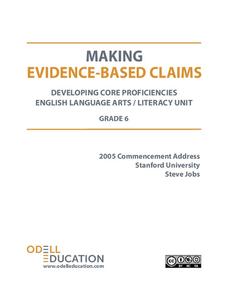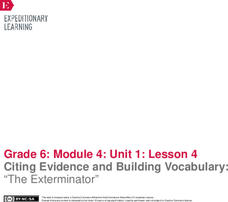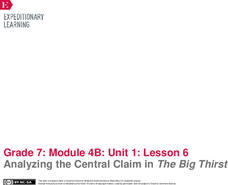Curated OER
Putting it Together: Analyzing and Producing Persuasive Text
Young orators demonstrate what they have learned about persuasion and persuasive devices throughout the unit by analyzing a persuasive speech and then crafting their persuasive essays. Class members engage in a role-play exercise, use...
Google
Beginner & Intermediate 5: Evaluating Credibility of Sources
Convey how to determine appropriate and credible online sources with a series of three lessons. After completing the lessons, class members will know what kinds of sources to use, how to identify credible sources, and how tone and style...
EngageNY
Grade 9 ELA Module 4, Unit 1, Lesson 10
What can consumers do to pressure companies to produce "ethically manufactured goods"? Readers examine the evidence Amy Odell uses in the supplemental text "How Your Addiction to Fast Fashion Kills" to support her argument and her...
Literacy Design Collaborative
The Scarlet Letter and Hester Prynne
Is Hester Prynne a virtuous woman? To conclude a unit study of Nathaniel Hawthorne's The Scarlet Letter class members craft an argument essay in which they use the standards listed in Proverbs 31 from the Bible to judge Hester's virtues.
EngageNY
Writing an Argument Essay: Evaluating the Model and Crafting a Claim
Pupils prepare to write argumentative essays based on Shakespeare's A Midsummer Night's Dream. They begin weighing evidence and crafting claims for their writing about control.
EngageNY
Evaluating an Argument: The Joy of Hunting
After listening to "Interview with an Organic Farmer," class members identify the claim the farmer makes in his interview. They use lined paper to create a four-square organizer for relevant evidence, sufficient evidence, irrelevant...
National Endowment for the Humanities
Martin Luther King, Jr. and Nonviolent Resistance
Was nonviolent resistance the best means of securing civil rights for black Americans in the 1960s? In this highly engaging and informative lesson, your young historians will closely analyze several key documents from the civil rights...
National Endowment for the Humanities
Chronicling America: Uncovering a World at War
As part of a study of World War I, class members read newspaper articles from the time that urge American involvement, non-involvement, or neutrality. Using the provided worksheet, groups analyze the articles noting the central argument...
Personal Genetics Education Project
Direct-to-consumer Genetic Testing
If you knew that you were likely to develop Alzheimer's disease in your future, how would it affect your life in the meantime? This and other similar thought-provoking questions are discussed in a lesson plan about the availability of...
Sullivan County BOCES
Reading Closely Teacher Manual
Wolves are the subject of a series of images, informational texts, videos, websites, and narratives. The activities prompt learners to use close reading skills, including reading closely for textual details, making evidence-based claims,...
EngageNY
Grade 9 ELA Module 4, Unit 1, Lesson 24
Who bears the most responsibility for ensuring that goods are ethically produced? Using evidence drawn from Sugar Changed the World: A Story of Magic, Spice, Slavery, Freedom, and Science, the unit's central text, and from the...
Classroom Law Project
What should I watch for in the debates?
Prepare your classes for election year debates with a series of activities that model how to watch televised debates and how to evaluate the moderators as well as the debaters.
Museum of the Moving Image
AdMaker, Obama vs. McCain, “Fundamentals” (2008)
Truth is often left on the cutting room floor when political ads are produced. After viewing the 2012 backfire ad, "Fundamentals" that takes John McCain's comments on the US economy out of context, class groups edit the audio and video...
iCivics
Drafting Board: Military Intervention
Should countries use their militaries to stop humanitarian crises in other countries? Learners make claims, organize their reasoning, and provide evidence for their arguments with this rich resource.
iCivics
Drafting Board: Electoral College
Should the president of the United States be voted by the Electoral College or the popular vote? Your young historians will consider the pros and cons of the Electoral College, and make an argument using reasons and evidence provided in...
School Improvement in Maryland
Affirmative Action
Do the government's affirmative action policies promote equity in the United States? The Fourteenth Amendment to the US Constitution and affirmative action policies come under scrutiny in an activity that asks class members to...
University of North Carolina
Annotated Bibliographies
When researchers write a paper, they become curators of information. It's their job to determine the best sources of information on a topic and use those sources to inform their writing. As part of a larger series, a handout on annotated...
Alabama Department of Archives and History
Voting Rights for Alabama Women
What were the arguments put forth by those who opposed the 19th Amendment? For those in favor? Class members examine primary source materials that illustrate the intense debate in Alabama about women's suffrage.
Beverly Hills High School
Congress of Vienna 1815
Europe was changing in the early nineteenth century, and the Congress of Vienna largely sought to slow and contain those sweeping changes. A slideshow presentation illustrates the details of the Congress of Vienna, including its three...
Odell Education
Making Evidence-Based Claims: Grade 6
In order to make evidence-based claims, one must be able to draw explicit information from text. From here, learners take that information, analyze the text to develop a deeper understanding, and connect with the information in order to...
Newseum
Slanted Facts and Slippery Numbers
The Internet is known as the information superhighway, but sometimes it's hard to know when to hit the brakes on unreliable sources. Using a well-rounded lesson plan, pupils read and summarize articles about the gender pay gap and...
Maryland Department of Education
The Concept of Identity Lesson 7: Logical Fallacies
What are the effects of competition in an academic environment? The competition between the main characters in A Separate Peace motivates a series of activities that asks readers to take a stance on competition, and then to develop a...
EngageNY
Citing Evidence and Building Vocabulary: “The Exterminator”
It is an out-of-body experience. Scholars take a look at the sidebars outside the body of the text in The Exterminator. They discuss the purpose of this type of text feature and work to determine the gist. Learners write unfamiliar...
EngageNY
Analyzing the Central Claim in The Big Thirst
Quench the class's thirst for knowledge while building analytical skills. Scholars listen as the teacher reads excerpt from the book The Big Thirst. They then complete a close read and answer text-dependent questions from pages one...

























